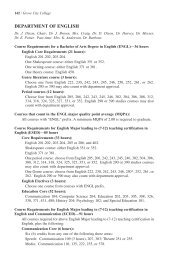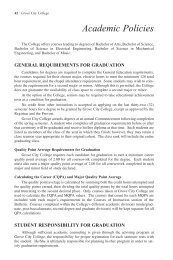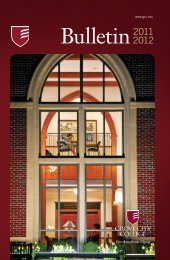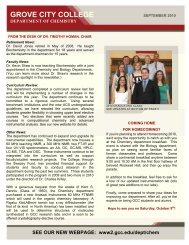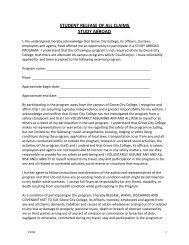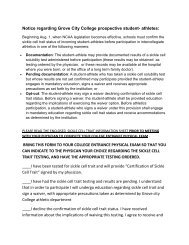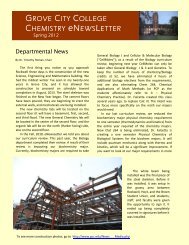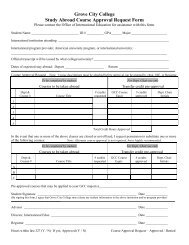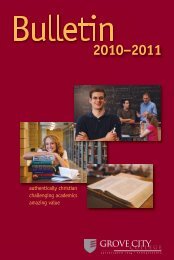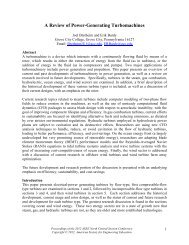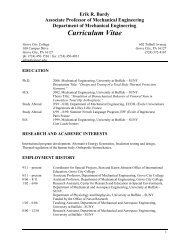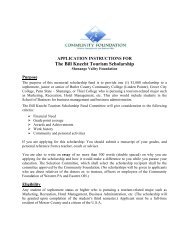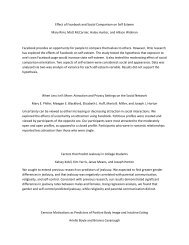2009–2010 - Grove City College
2009–2010 - Grove City College
2009–2010 - Grove City College
You also want an ePaper? Increase the reach of your titles
YUMPU automatically turns print PDFs into web optimized ePapers that Google loves.
156 / <strong>Grove</strong> <strong>City</strong> <strong>College</strong><br />
MECE 370. INDEPENDENT RESEARCH. An opportunity to conduct supervised research in<br />
Mechanical Engineering. Junior standing and permission of the department chair and a faculty sponsor<br />
is required. A combined total of up to three credit hours for independent study, independent<br />
research, and honors courses can be applied towards the Mechanical Engineering elective requirements.<br />
Semester course, one, two or three hours.<br />
MECE 390. SPECIAL MECHANICAL ENGINEERING TOPICS. Special topics in mechanical<br />
engineering based on student demand and faculty interest. Specific subject matter varies each semester<br />
with prerequisites and credit hours announced in advance of registration. This course can be used<br />
to satisfy a portion of the mechanical systems elective requirements in Mechanical Engineering.<br />
Semester course, one, two, three or four hours.<br />
MECE 391. SPECIAL MECHANICAL ENGINEERING TOPICS. Special topics in mechanical<br />
engineering based on student demand and faculty interest. Specific subject matter varies each semester<br />
with prerequisites and credit hours announced in advance of registration. This course can be used<br />
to satisfy a portion of the thermal systems elective requirements in Mechanical Engineering.<br />
Semester course, one, two, three or four hours.<br />
MECE 401. CAPSTONE DESIGN I. Completion of the senior design project. A study of the principles<br />
and methods of designing mechanical engineering systems in today’s society, including the<br />
design process; decision making in design; engineering economics; analysis and verification of performance;<br />
and environmental impact. Corequisite: Mechanical Engineering 451, prerequisite: senior<br />
mechanical engineering standing. Fall semester only, three hours.<br />
MECE 402. CAPSTONE DESIGN II. Completion of the senior design project. A study of the principles<br />
and methods of designing mechanical engineering systems in today’s society, including the<br />
design process; decision making in design; engineering economics; analysis and verification of performance;<br />
and environmental impact. Corequisite: Mechanical Engineering 452, prerequisite:<br />
Mechanical Engineering 401. Spring semester only, three hours.<br />
MECE 407. CONTROL SYSTEMS. A study of the design and analysis of feedback control systems.<br />
Topics include: modeling of dynamic systems (mechanical, electro-mechanical, thermal and<br />
fluid), a review of Laplace transform techniques, steady-state error, stability, root locus design methods,<br />
Bode analysis/stability margins, and Bode compensator design. Introduction to state-space techniques<br />
and the digital implementation of controllers. Includes Matlab/Simulink simulations.<br />
Prerequisites: Electrical Engineering 210, Engineering 274, and Mechanical Engineering 316.<br />
Spring semester only, three hours.<br />
MECE 408. MECHANICAL VIBRATIONS. A study of the dynamic response of lumped parameter<br />
systems with one and two degrees of freedom subjected to periodic and non-periodic excitation;<br />
applications to the control of undesirable vibrations in machines; theory of seismic instruments; and an<br />
introduction to distributed parameter systems. Prerequisites: Mechanical Engineering 311 and 316.<br />
Fall semester only, three hours.<br />
MECE 414. PRINCIPLES OF HEATING, VENTILATING, AND AIR CONDITIONING.<br />
Analysis and design of components and systems used to condition air in buildings. Topics include airconditioning<br />
systems, psychrometrics, conditioning processes, indoor air quality, heat transfer, solar<br />
radiation, heating loads, cooling loads, annual energy usage, pumps and piping, fans and ducts, heat<br />
exchangers, and refrigeration equipment. Prerequisite: Mechanical Engineering 326.<br />
Fall semester only, three hours.<br />
MECE 415. FINITE ELEMENT ANALYSIS. A study of the finite element method and its application<br />
to mechanical engineering problems. Topics include basic concepts; stiffness matrices; truss<br />
structures; flexure elements; method of weighted residuals; interpolation functions; and applications to<br />
heat transfer, fluid mechanics, solid mechanics, and structural dynamics. Prerequisites: Engineering<br />
274, Mechanical Engineering 312 and 326. Fall semester only, three hours.<br />
MECE 416. SURVEY OF ALTERNATIVE ENERGY SYSTEMS. A study of alternative energy<br />
systems including fuel cell technology and heat exchanger design. Topics include modeling and analysis<br />
of heat exchangers, fundamentals of fuel cell operation, and a survey of alternative energy technologies.<br />
A project is assigned to each topic. Prerequisite: Mechanical Engineering 326.<br />
Spring semester only, three hours.



